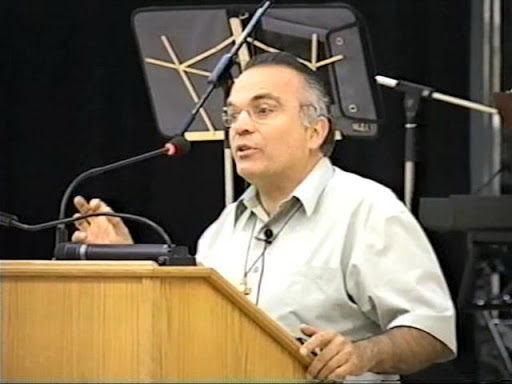What Communism and torture couldn’t do, American culture was able to do without even trying; without even trying. Torture for four weeks couldn’t break this man’s love for the Eucharist, but materialist culture did it in a short time, without even trying.
The same thing happened in Poland. Communism was not able to break the people’s faith, but within a few years of Communism falling, materialism did, without even trying. The rate of practice dropped, because people got caught up in material things and became lazy. We get sucked into the lure of riches and that is also what has happened in this country. ‘How hard it is for the rich man to enter the kingdom of heaven’ (Matthew 19:23).
Every so often the Church becomes big and powerful and then it starts to get lethargic and lazy. Right now we have things easy, because we can practice freely and that’s when people get lazy. Look at what has happened in first world countries over the last several decades. There has been a continual abandoning of the faith. It is an age of apostasy. You will hear people say, ‘But I’m a good person…’ God doesn’t just ask us to be good people, but to acknowledge him, to worship him and live by his Commandments. The first commandment: ‘I am the Lord your God; you will not have strange gods before me.’ The first three Commandments are about God. Don’t misuse God’s name. Keep Sunday as a holy day, when God comes first. The first half of the Our Father is about acknowledging God.
‘But I don’t have time to go to church because my kids have sports.’ When you die and come before God you can tell him that you ignored his Commandments because your kids had sports. ‘Anyone who prefers father or mother to me, is not worthy of me. Anyone who prefers sons or daughters to me, is not worthy of me’ (Matt 10:37). I know it is easy for me to say that and it is hard for parents to choose, because sports have been put on Sunday morning. Who do you think did that? Satan did, because he is smart and knows that parents will find it harder to choose for church.
To follow God is not easy. ‘Unless you take up your cross, you cannot be my disciple.’ Being faithful to God means having to make difficult decisions.
 |
| Pilgrims on top of 'Cross Mountain', Medjugorje. |
The recent lockdown was a good reminder to us of just how easily the Eucharist can be taken away from us and that was a good thing, because it was a wake-up call. I have heard so many people say, ‘This is the US, we will always be free to practice our faith here.’ That was also said in all the countries where religious persecution began. It can happen much more easily than you might think. Ireland was 99% Catholic when the most savage religious persecution began, because the British government passed a few laws.
Do you really have complete religious freedom if you are put under pressure to choose between your children’s sports and going to church? It is a subtle, but real form of undermining faith.
If we want to remain strong in our faith, it takes work and fidelity. It takes a certain discipline and commitment. The Lord’s day must come before anything else. Worship of God must come before anything else. I must go out of my way to pass on the faith to my children. The best way for me to keep my faith strong and alive in our country, is to live it as well as I can. It starts with me, not with what the church down the road is doing. It starts with me.
I often think of how people get so obsessed with gaining wealth, that they lose all sight of what their life is about, and this is exactly what the Lord says:
‘What profit would it be for a man to gain the whole world, but to forfeit his life?’
Let me share with you part of the testimony of a man called Dale Recinella. Dale was a very successful attorney based in Miami. He was also a devout Catholic. In 1984 he changed law firms and his workload increased greatly. The focus on his faith became more difficult, because of the demands of his work. However, he was able to provide a very nice life-style for himself and his family.
In 1986 he handed over the deposit for the construction of their new dream-home in Tallahassee. That evening they went to out to dinner to celebrate, but first they went to mass. During the mass they heard the Gospel of the rich young man, who asked Jesus what he must do to inherit eternal life (Mark 10:17-25). You know the story, Jesus tells him to keep the commandments. He says that he already does this, so what else should he do. Jesus says, ‘If you wish to be perfect, go sell what you have, give the money to the poor and come follow me.’ But the young man went away sad, for he was a man of great wealth. And Jesus went on to say, ‘How hard it is for a rich man to enter the kingdom of God.’
When Dale and his wife Susan heard this, it hit them in a different way. During dinner, Dale said to his wife, ‘Do you think he meant it?’ And Susan said she didn’t know, but nobody really takes that literally. They decided to pray about it and ask the Lord to speak to them.
Some time later Dale woke up screaming in the middle of the night from a nightmare. Susan pressed him to tell her what had happened. He explained that he had suddenly found himself outside their house raking leaves with their kids. Suddenly he heard this voice of indescribable beauty which seemed to be coming from the setting sun. He wanted to follow it. Everything in him knew he had to follow it, but as he tried he could not and when he looked down he saw a massive chain attaching him to the house. He did everything he could to break the chain, but he could not. The voice was starting to fade and he was getting more and more desperate until eventually the voice was gone and he was left alone in the dark, which was when he woke up screaming. They realized that God was speaking to them and that they had choices they needed to make.
Eighteen months later, Dale and his wife were out eating and he had a raw oyster. As soon as he took the first bite, he knew something was wrong. Shortly after he found himself in hospital and the doctor telling him that he had 10 to 12 hours to live. He had eaten a deadly bacterium called vibrio fulnificus, which almost certainly causes death and there was nothing he could do. But after he went unconscious, Jesus visited him again. This time he found himself in a room and Jesus was in front of him in all his radiant beauty, but Jesus was looking at him with eyes of sorrow and the question Jesus asked him was, ‘What have you done with all my gifts.’ Jesus showed him all the gifts he had blessed him with, his intelligence, upbringing, education, personality and all the things that had helped to bring him worldly success. Immediately he began to defend himself saying that he had worked hard to give a good life-style for his family. They were safe, lived in a good neighborhood. His kids went to good schools and their future was well provided for. But he realized as he said this, that everything he was talking about was for himself. Everything he had gained was only focused on himself and his family. And finally Jesus said, ‘What about all my people who are suffering?’ He knew that he had no answer for this, only the shame of seeing his own neglect of everyone but himself.
To cut the story short, he woke up early the next morning to the doctors unbelief. They had no explanation for it and said that what had happened was inexplicable. He knew that Jesus had given him another chance. From then on he completely changed his life-style. They began to live a much simpler life and he ended up working in a prison ministry, helping those on death row.
Why did all this happen to him? Not just to speak to him, but also to speak to us. Our world tells us that we need only look out for ourselves. If we have enough left over and enough time, then we can also reach out to others. But that is not what the Gospel teaches us. The Lord teaches us that our gifts and talents are not just for ourselves, but also for the people around us. When we have been blessed with gifts and opportunities, they are not just for ourselves, but also to help God’s people around us. We may have been placed in the exact place we find ourselves, because God wants us to take care of others who need it. We must be careful to use our gifts and talents well, because they are not just for ourselves. They are gifts which have been entrusted to us. Thank God if you can enjoy a comfortable life-style, but remember who gave it to you and remember that we have a God-given responsibility to use those gifts properly. What we have here on earth is only for a very short time.
‘What profit would it be for a man to gain the whole world, but to forfeit his life?’












